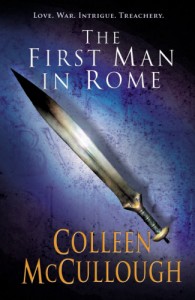While talking about all things Roman, I thought I'd share my own introduction to Rome. Before I'd gone there, before I'd read Suetonius or Plutarch or anyone else, I read this book – THE FIRST MAN IN ROME. (To be honest, I'd been forced to read Shakespeare's JULIUS CAESAR in 7th grade, and hated it with the passion of a burning star. Perhaps I was badly taught, or perhaps I was just 12 years old and exceedingly stupid. Hard to say). But this book was my real discovery of Ancient Rome.
 THE FIRST MAN IN ROME is the first of seven novels by Colleen McCullough dealing with the period we call the end of the Roman Republic. A masterful blending of historical fact and conjecture, rife with period details and amazingly vivid portrayals of the Roman mind, this novel is the gateway to understanding the rise and fall of Julius Caesar.
THE FIRST MAN IN ROME is the first of seven novels by Colleen McCullough dealing with the period we call the end of the Roman Republic. A masterful blending of historical fact and conjecture, rife with period details and amazingly vivid portrayals of the Roman mind, this novel is the gateway to understanding the rise and fall of Julius Caesar.
Indeed, the novel begins with Caesar's grandfather, also named Gaius Julius Caesar. We meet the impoverished noble family, august in lineage but poor in purse, as they journey on New Year's Day to see the inauguration (literally, augurs are involved) of this year's consuls. Two other men in the crowd, unknown to each other, are Gaius Marius and Lucius Cornelius Sulla. They are a study in opposites, from temprament to background.
Marius, an Italian New Man with no noble Roman ancestors, is the quintessential military man. He has made a fortune through warfare, and has scrabbled up Rome's political ladder as far as an Italian-born man would ever be allowed.
Sulla, on the other hand, is one of many men from a noble line who lacks the funds to follow the career his blood entitles him to. Instead he associates with the dregs of society – actors, mummers, professional pretty-boys. He ends up murdering first the heir to his step-mother's fortunes, then his own mistress, and finally his step-mother, earning him enough money to enter the Senate and fulfill his birthright.
Both men are embraced by Fortune, and their lives come together, uniting them to stop an invasion of barbarian Germans. As a reader I became enamored of them both, and lacking the knowledge of the history I didn't have even a hint of foreboding until the very end of the novel.
This book also gives us the Saturninus riots and the birth of Julius Caesar. McCullough lays the groundwork for Caesar's career here. I have deep feelings for each novel in this series, loving nearly all of them for very different reasons. This is the novel that shows why Rome was great – and also why it would someday fall. The seeds are sown in this novel of the change from Republic to Empire. Each constitutional change was necessary at the time for Rome's survival, though most would not have been necessary had the Senate and People of Rome had a little foresight, and curbed the hubris and greed of the first class.
Parallels, anyone?
I have never read THE THORN BIRDS, so my introduction to Ms. McCullough was this novel. Actually, I first encountered it on a road trip home from college as an audiobook, read by the inimitable David Ogden Stiers. As an overview, it's fantastic. The novel is even better. (Snails, anyone?)
A fantastic read, the first of several.
(This first appeared on my other blog, A Dark Wood)


That series is among my favourites.
Merry Christmas to you and your family.